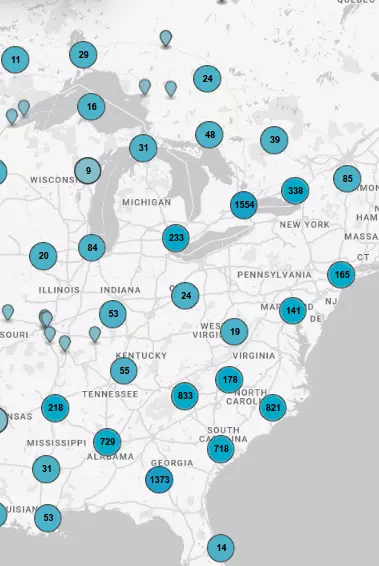Statesboro High School
In 1890 citizens organized in built the city’s first school, the Statesboro Academy, at the corner of North Main and Church Streets. For ten years it served the needs of the community. In 1901 a...
- lat34
Brooklet, Georgia
Brooklet, known for its Avenue of Oak trees, took shape at the end of the 19th century on property owned by A. J. Lee. Optimistic citizens built a new town beside the recently completed Savannah...
- lat34
Old Portal
The original Portal was located 2 miles north of the current site on Old Portal Road. It got its name in 1894, when the U.S. Postal Service approved a post office for Portal. The E. E....
- lat34
First Baptist Church of Statesboro
CONSTITUTED SEPTEMBER 3, 1882 Rev. W. M. Cowart, First Pastor Charter Members Deacon Edmond Kennedy, Deacon A.B. Miller, W.B. Corey, Joseph Tillman, James Price, J.J.M. Griner, Moselle Miller,...
- lat34
The Willow Hill School and Community
In 1874, nine years after the Civil War ended, a group of former slaves of the Riggs, Donaldson, Parrish, and Hall families founded the Willow Hill School to serve the area’s black children....
- lat34
United States vs. Darby Lumber Company
The U.S. Supreme Court’s 1941 decision United States vs Darby Lumber Co. in a landmark ruling in American legal history. The case affirmed the federal government’s ability to regulate employment...
- lat34
Harville House
Samuel Winkler Harville purchased this 754-acre farm in 1862. Born on December 17, 1826. Harville was one of two delegates Bulloch County sent to the 1861 Secession Convention in Milledgeville....
- lat34
Nevils Station & Shearwood Railroad
This is the site of the Nevils railroad station. The paved road from Denmark to Nevils is the original bed of the Shearwood Railroad that existed from 1912 to 1937. John N. Shearhouse of Brooklet...
- lat34
Savannah & Statesboro Railway
This path follows the roadbed of the Savannah & Statesboro Railway (S&S RY), completed in 1899. It was created through the interests of timbermen and turpentiners and through the dreams of...
- lat34
Pioneer Turpentining Experiment
Dr. Charles Holmes Herty of University of Georgia Chemistry Department conducted experiments in this forest that revolutionized the naval stores industry in America. Inspired by conservative...
- lat34
Skirmish at Statesboro
Approaching Statesboro on Dec. 4, 1864, a strong party of mounted foragers from Hazen´s division, 15th Corps (USA), on th right of Gen. Sherman´s army on its destructive March to the Sea,...
- lat34
The March to the Sea
On Nov. 15, 1864, after destroying Atlanta and cutting his communications to the North, Maj. Gen. W.T. Sherman, USA, began his destructive campaign for Savannah - the March to the Sea. He...
- lat34
Old Savannah Road
The highway crossing here is the Old Savannah Road, one of the earliest vehicular routes west of the Ogeechee River. It led from Savannah to the Rock Landing on the Oconee, to the south of...
- lat34
Old River Road
The highway crossing here is the Old River Road, one of the earliest white man´s routes west of the Ogeechee. The State authorized the opening of this portion of the old thoroughfare in 1777....
- lat34
Bulloch County
Bulloch County was created by Act. of Feb. 8, 1776 from Bryan and Screven Counties. Originally, it contained part of Evans, Candler, Emanuel and Jenkins Counties. It was named for...
- lat34
John Abbot (1751-1839) Ornithol ogist,Entomologist, Artist
1/3 Mi. In the old McElveen Cemetery, one-third of a mile northeast of this marker, is the grave of John Abbot, pioneer naturalist of Georgia. Abbot was born in London June 1, 1751, and in...
- lat34
Union Meeting House (Organized 1790)
Three miles east of this point, on the old River road, is located union Meeting House (Methodist), the oldest church in Bulloch County, and one of the oldest churches in Georgia...
- lat34
Bryan Neck Presbyterian Church
This church, the oldest congregation in lower Bryan County, was certified by the Presbytery of Georgia in 1830. Its founders included rice planters on Bryan Neck, among them Thomas Savage Clay,...
- lat34
The Clay Family of Bryan Neck
In this cemetery are interred members of the Clay family, among the most prominent of Bryan Neck and coastal Georgia from the colonial era of Georgia through the 19th century. Prominent among...
- lat34
The "Bottom" Village
The “Bottom” residential village, built in the mid-1930s, was the first housing project developed by Henry Ford for his employees in the Ways Station (later Richmond Hill) area. The...
- lat34
